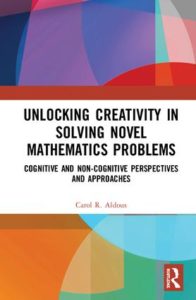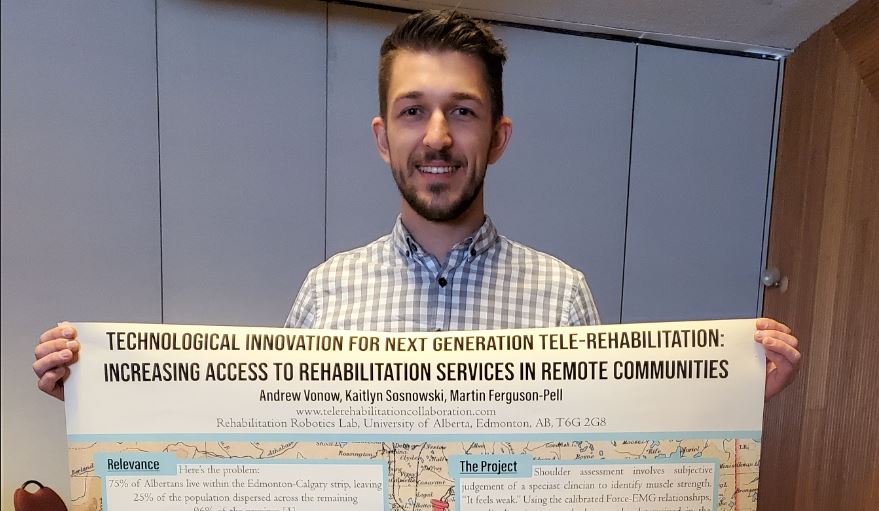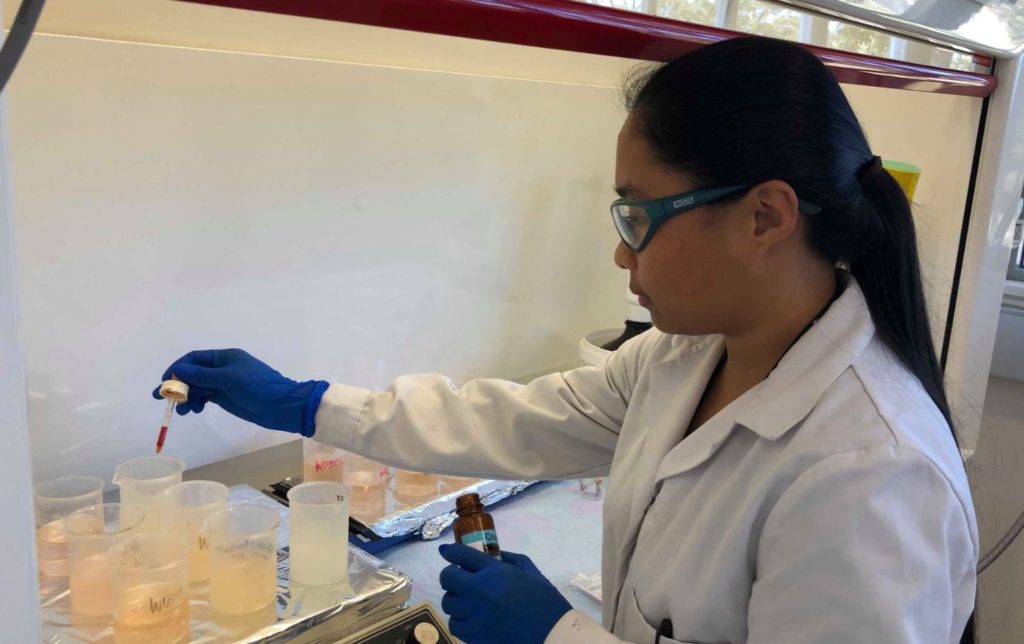
New book embraces a fresh approach to maths learning, engineering student takes out international prize in Canada, postdoc wins competitive ANSTO award and three Colleges celebrate significant childhood grant wins.
Creativity embraced in fresh approach to maths
 A new book by Dr Carol Aldous Unlocking Creativity in Solving Novel Mathematics Problems (Routledge, 2019) is offering new fresh insights into thinking and feeling approaches used in creative problem solving.
A new book by Dr Carol Aldous Unlocking Creativity in Solving Novel Mathematics Problems (Routledge, 2019) is offering new fresh insights into thinking and feeling approaches used in creative problem solving.
Dr Aldous’ book has a strong focus on research, analysing ways of identifying, describing and measuring intuition when problem solving, focusing on a creative new problem-solving conceptual framework that uses both cognitive and non-cognitive elements.
The book is widely available, including through Dymocks, Amazon, Booktopia and Angus and Robertson. Its innovative approach is equally relevant to teachers, student and the broader community including business and industry.
Award during biomed placement in Canada

Fourth-year biomedical engineering student Andrew Vonow has won ‘Best Overall Poster Presentation’ award at the 20th Annual Alberta Biomedical Engineering Conference placement in Canada.
He is on a work-integrated learning placement with University of Alberta Professor Martin Ferguson-Pell, who has collaborated with Flinders University researcher Dr David Hobbs.
“Andrew is reaping the benefits of his time with the leading Canadian rehabilitation engineering and assistive technology group at the University of Alberta,” says Dr Hobbs, one of Andrew’s lecturers in the College of Science and Engineering.
Dr Hobbs says the recognition demonstrates the value of exposure to an international placement.
Mr Vonow is completing a double degree for a Bachelor (Hons) and Master of Engineering (Biomedical). He plans to continue his research into wearable technology for measuring ground reaction force in athletes to provide feedback on dangers in an athlete’s movement, in particular during netball activity.
He also hopes to support Dr Hobbs in further evaluation of a gaming control device for Parkinson’s.
“My work is the first part of a project which offers to patients a method of receiving clinical assessments which currently require specialists to be on-site to perform, specifically looking at shoulder assessment,” Mr Vonow says.
“Two years ago, Matthew McKenzie completed his WIL here in the same lab, looking at wheelchair biomechanics for (another kind of) shoulder rehabilitation. He has now graduated and is working in Sweden!”
Travel brings research progress

Postdoctoral researcher Dr Maria Angelica ‘Angel’ Rea is set to work with Australia’s Nuclear Science and Technology Organisation (ANSTO) with assistance from a $10,000 Early Career Research Grant from the Australian Institute of Nuclear Science and Engineering (AINSE).
Her supervisor is Associate Professor Rachel Popelka-Filcoff, who congratulated her for winning the highly competitive award.
Dr Rea’s work focuses on examining the influence of seasonal variation on radionuclide association to fauna and microfauna in Australian arid environments.
“This project is collecting fundamental data of natural background radiation concentrations in biota to assist in the evaluation of environmental impacts of the resources industry and other industries such as energy production and agriculture, by providing new knowledge of the behaviour of naturally occurring radionuclides in the environment,” Dr Rea says.
She is currently working on the industry funded project “Improving the Relevance of International Radiological Risk Assessment Tools to Australian Arid Environments”, led by radiochemist Associate Professor Popelka-Filcoff, along with Flinders researchers Professors Allan Pring, Claire Lenehan and Craig Simmons. This is a collaboration between industry partners BHP, Heathgate Resources, OZ Minerals, NERA (National Energy Resources Australia), JRHC Enterprises and government partners (ANSTO and ARPANSA).
Data generated provide valuable information on the Australian arid region, strengthening assessments of potential radiological impacts to Australian biota.
Six grants for childhood research
Significant new grants from the Channel 7 Children’s Research Foundation will fund six vital areas of research at Flinders University.
The 2020 projects receiving collective funding of almost $600,000 will investigate interventions for child protection, reducing pregnancy risk, remote and marginalised children’s education, Indigenous family and refugee community health and wellbeing, and autism therapy.
The new projects will be led by chief investigators from three Colleges:
Dr Jacqueline Beall (College of Medicine and Public Health) – Embedding a targeted therapeutic intervention to reduce child maltreatment into routine antenatal care: a feasibility and acceptability study.
Dr Michelle Jones (College of Education, Psychology and Social Work) Understanding outcomes in child protection: Exploring a capability approach to change the conversation for Aboriginal families
Associate Professor Parimala (‘Pammi’) Raghavendra (College of Nursing and Health Sciences) – Can LEGO® robotics therapy improve the mental health and social skills of adolescents on the autism spectrum? A Phase 1 trial
Dr Kerrie Mackey-Smith (College of Education, Psychology and Social Work) – Multimodal storytelling for life: Building literacies and numeracies for agentive futures for children marginalised by social circumstances including remoteness, poverty or culture.
Dr Amy Wyatt (College of Medicine and Public Health) – Protein misfolding in pregnancy and links between stabilising pregnancy zone protein and complications such as preeclampsia.
Associate Professor Anna Ziersch (College of Medicine and Public Health) – Neighbourhood life and social determinants of health for children and young people from refugee backgrounds

